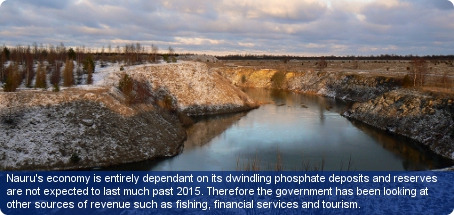Find a business in Nauru

The island state of Nauru in the western Pacific Ocean has a strong GDP per capita of US$7,770 (2012) for a small island; this is because of its phosphate reserves. However, revenues from phosphate mining are not expected to last much beyond the mid-2010s and therefore the government has been exploring other sources of revenue – with GDP growth equalling -2.4% per annum in 2008-12. Fishing, tourism and financial services are cited as the sectors that will provide growth in the future as there is very limited potential for agriculture – the only fertile areas are the narrow coastal belt and the land surrounding the Buada lagoon.
There is very little data is available on the economy for the tiny Pacific island of less than 4 square miles with a population of 13,000. While agriculture, forestry and fisheries combined provide 12% of Nauru’s GDP, the majority of that input comes from fishing: not as a local commercial industry but through sales of fishing licences. Nauru sells access to its extensive Exclusive Economic Zone (EEZ) to China, Taiwan, Japan and Korea as well as to countries participating in the South Pacific Tuna Treaty, such as Australia, New Zealand and the USA.
As one of the great phosphate rock islands in the Pacific Ocean, mining has played a dominant role in Nauru’s history and economy. Decades of extensive mining by private companies and foreign governments, and continued by the Nauru Phosphate Corporation, had essentially depleted Nauru’s phosphate resources by the 1980s. After significant repairs to infrastructure, mining of the remaining phosphate reserves recommenced in 2007. Remaining phosphate reserves are expected to drain quickly but there is a focus on developing the infrastructure and training needed to create an industry for mining secondary phosphate whose reserves could hold out for a few decades.
Few other resources exist, apart from phosphate, with most necessities being imported, mainly from Australia, its former occupier and later major source of support. Given the size of the island there is very limited potential for agriculture and the country is dependent on imports for basic necessities such as food, consumer and capital goods. Very few Nauruans work or live abroad so there is very little foreign exchange coming into the country in the way of remittance income. But the rehabilitation of mined land and the replacement of income from phosphates are serious long-term problems.
As Nauru consists of one island comprising 21 square kilometres, the entire island is accessible. There is a sealed road of 19 km that encircles the island. The airport is serviced by Our Airline, Nauru’s state-owned airline, which provides weekly cargo and passenger flights, as well as charter flights, to Brisbane with stops in Honiara for refuelling.
For the majority of Nauruans, Nauruan is their first language but English is the official language and widely spoken. Historically, most Nauruans have been employed in phosphate mining and in the public sector, working for the government and various agencies; the private sector in Nauru is very small.



